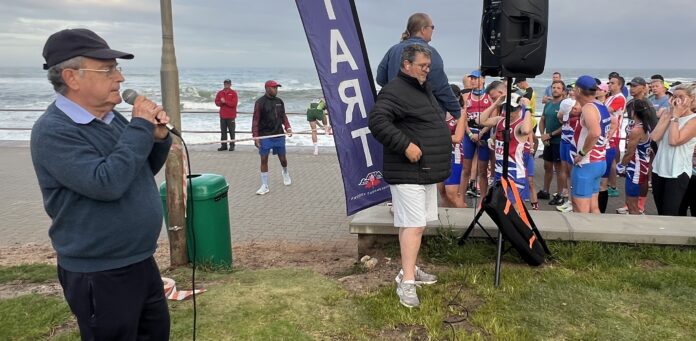For over fifty years, road and cross-country runners in the Western Cape have enjoyed the distinctive tone of Harold Berman’s voice, calling late-comers to quickly register and hasten to the start line, sending the field on their way before welcoming them at the finish and calling out the winners at the prize giving.
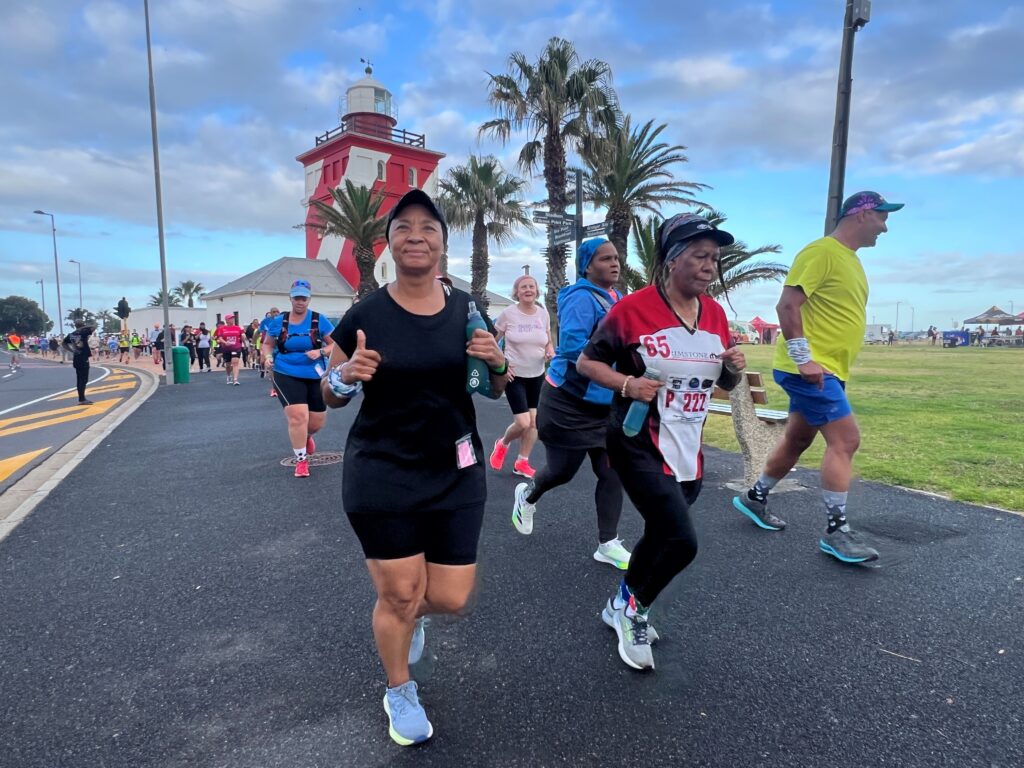
Calling the Runners’ Memorial 8km at Green Point Lighthouse on New Year’s Eve was Berman’s last official function before ‘hanging up his mic’ and formally handing over the baton to a younger generation of announcers.
Septuagenarians may recall pre-Berman days, when the late athlete, journalist and administrator, Charlie Savage, filled the role. Never one to waste words, little other than Savage’s curt ‘line-up’ was heard before the gun sounded.
“So to help out, I got hold of a loud hailer and thought it would be of interest to spectators to announce the winner as he or she crossed the line,” Berman explains. “That’s how it all started.”
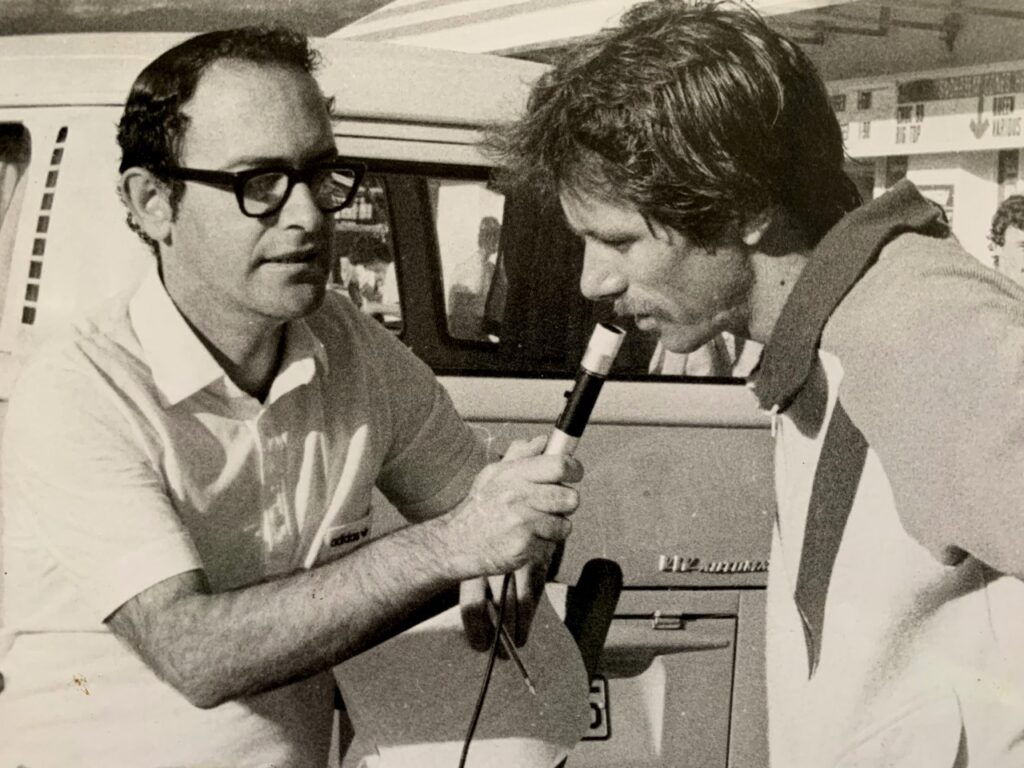
Berman’s interest in people, as well as athletics, brought a miscellany of information and facts to cross country and road races from the 1970s onwards. Those facts would include a concise, but accurate, running CV of the winner as he or she crossed the finish line – he had always done his homework.
What separated Berman from others, was his recognition of the runners, not just at the front end of the races, but also those regulars from the middle and back sectors of the field. And his intense interest and empathy with people resulted in Berman’s strong commitment and involvement in memorial races, such as Celtic Harrier’s Don Lock, UCT’s Memorial 10km and the Runners Memorial Race on New Year’s Eve.
Berman was largely responsible for the growth of the latter event, which fittingly marked the ‘finish line’ in his remarkable career. “The race used to be known as the Chris McKinnon Memorial Race, in memory of the WP athlete who died while training on the roads in Pretoria,” Berman recalls.
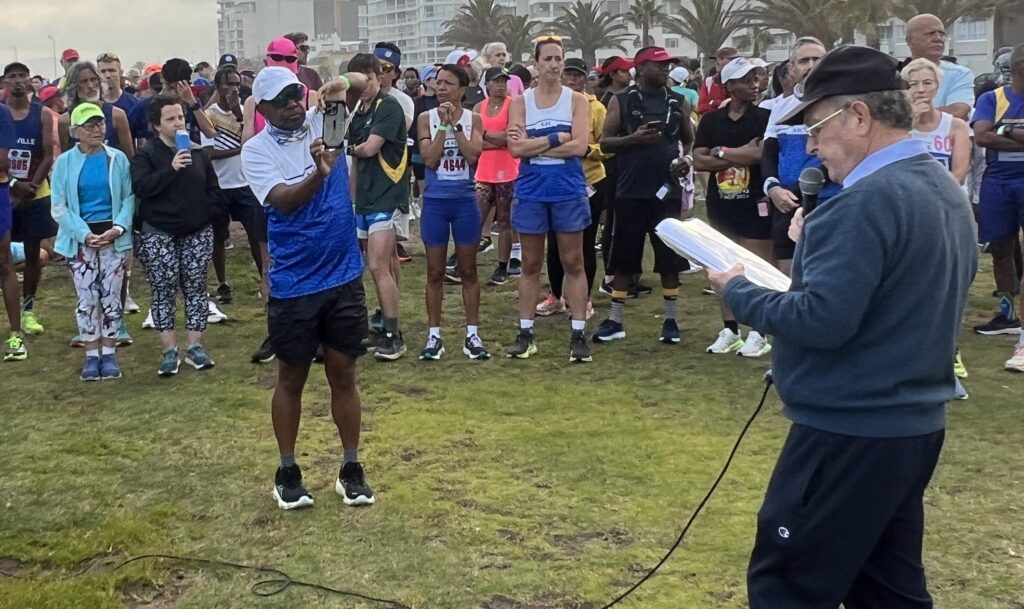
“Then runners from other clubs also passed away and I started to compile a list of names which I read out ahead of the race each year.”
Berman’s contribution to athletics in the Western Cape has been immense. While best known as an announcer, Berman has been a member of Claremont-based club, Celtic Harriers, for 63 years, having served the club as an administrator for 57, first as track captain in 1967, then as club secretary for 16 years before finally as club president, a position he still holds after 33 years at the helm.
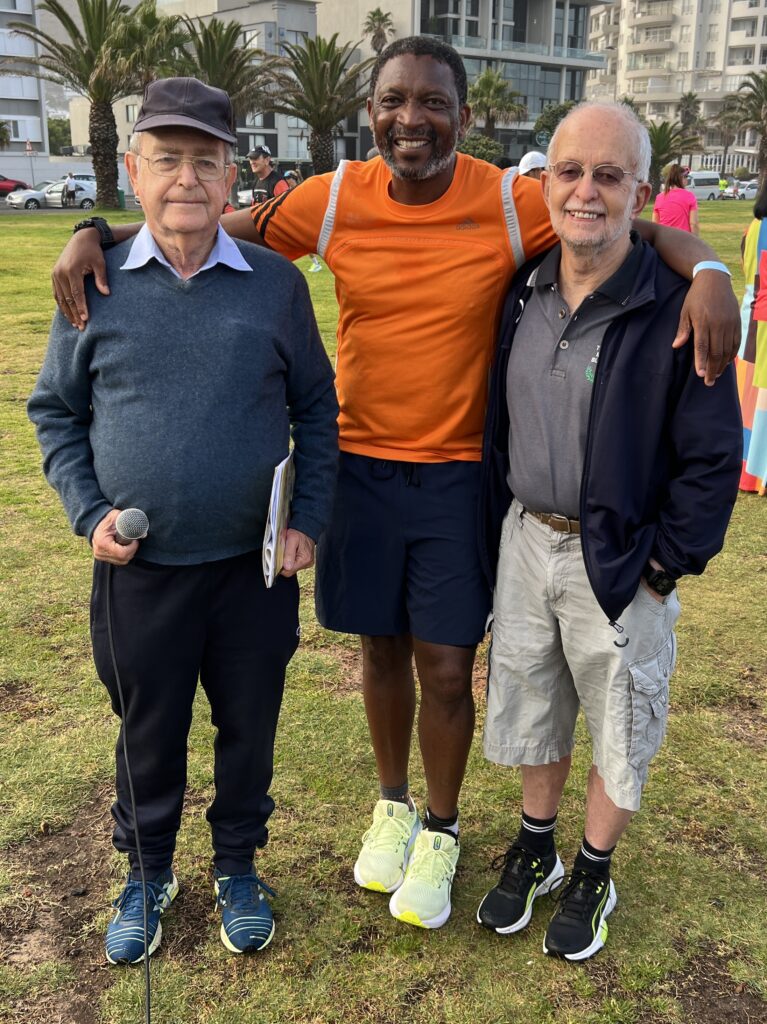
“It’s my passion for athletics which has kept me involved in the sport,” Berman admits. “Track came first – I was a time-keeper and track judge for around 30 years – then cross country, before road running began to dominate.”
Berman also qualified as a track time-keeper and served the sport well for many years in that capacity and relates an amusing incident in his early days serving in that capacity.
“I was acting as back-up timekeeper in an important track race. To sustain a record claim, there had to be a minimum of three watches on the winner.”
When the chief-timekeeper’s watch or fingers failed him at the start of the race, Berman willingly handed over his watch to ensure there would still be three watches on the winner at the finish.
“My watch provided the third recorded time need to secure the record and an important milestone in South African track history.”
Berman was also trackside for another stellar South African track meeting.
“I remember that I was responsible for calling out lap times and when Zola Budd ran the world 5000m record of 15 min 1,83 sec at Stellenbosch (January 1984) and particularly recall there that a fire broke out in the stadium that evening!”
The record was not recognised as South Africa was suspended from international athletics at that stage, but Budd officially claimed the record the following year when she raced to 14:48,07 while representing Great Britain.
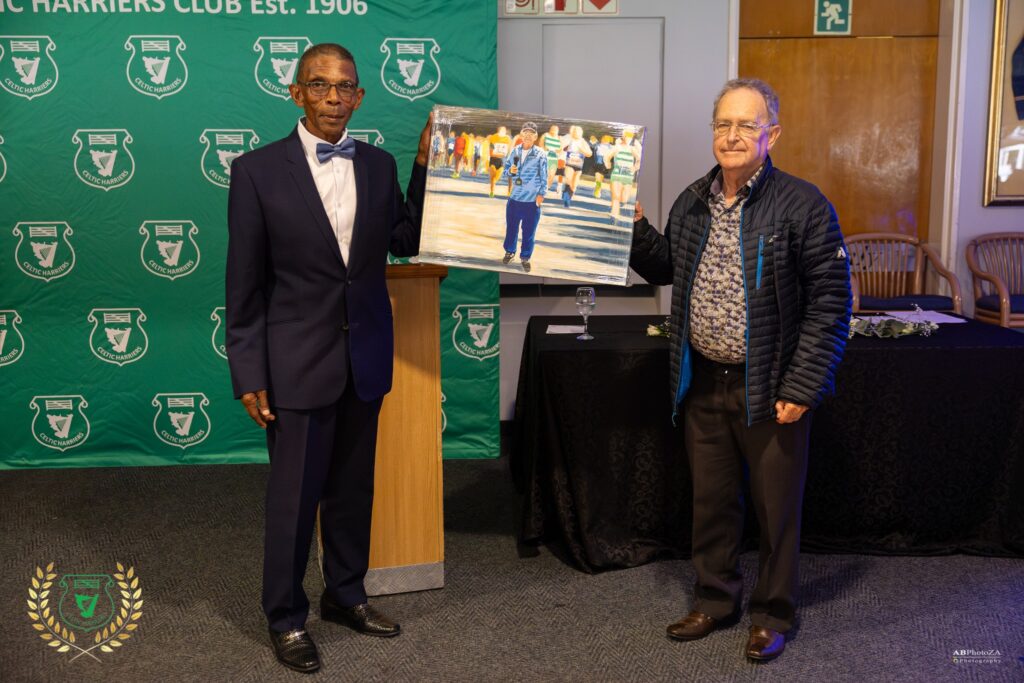
Berman has been honoured for his services to sport on several occasions, most recently last month when Celtic Harriers presented Berman a special painting of himself on mic at a road race and created a Harold Berman Award, recognising service excellence to the club. Peter Taylor, well-known for collecting for charity as the barefoot runner, was the first recipient of this award.
Berman’s most treasured award came in 1982 – a small plaque with an acknowledgement from Gert le Roux, well-known secretary of the then SAAAU, Athletics South Africa’s predecessor, in recognition of his services to athletics.
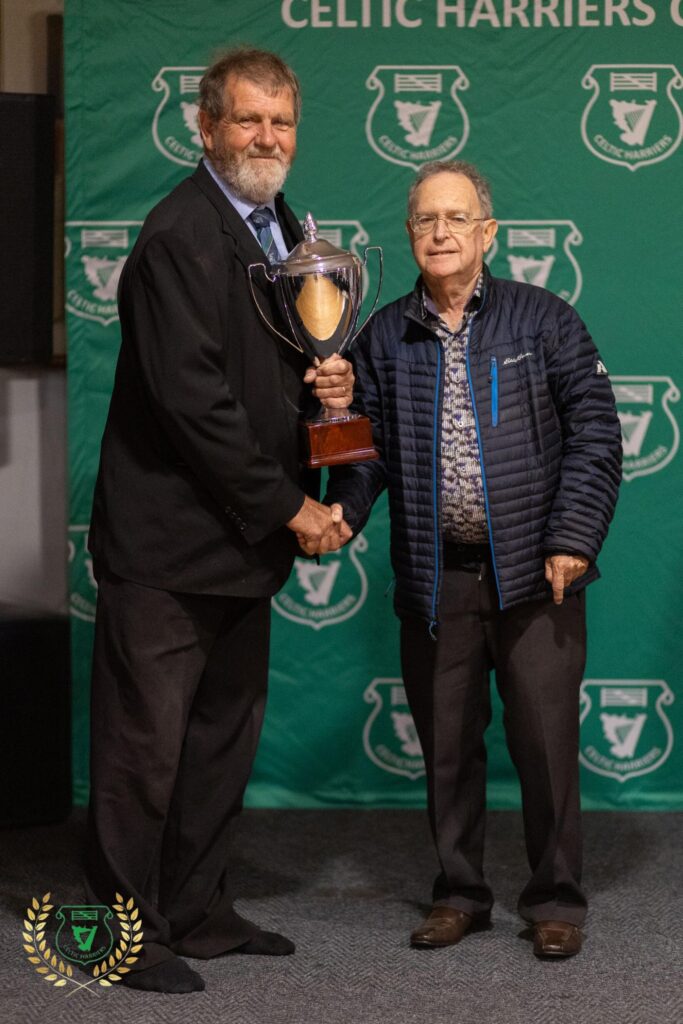
Berman has always believed in putting the interests of the sport first and was even prepared to bend the rules on occasion, when he felt they stood in the way of that primary belief.
“One year I was asked to be race referee as well as the announcer at the Voet van Africa Marathon at Bredasdorp,” Berman relates. “Two Oceans hero, Gabashane ‘Vincent’ Rakabaele, won the race comfortably but the third-placed runner came to me to ask whether I was going to disqualify Rakabaele as he wasn’t wearing his race number on his vest.
“I told him I could not attend to the matter immediately as I was occupied with announcing for the race and in the end, I decided to let the results to stand after being satisfied that Rakabaele wasn’t guilty of cheating in any way. Fortunately, no one came to complain!”
Berman’s sense of perspective and belief in the goodness of people carried him through his years of involvement in the sport, navigating potentially challenging moments. His sense of humour shines through as he shares many stories relating to his years as an announcer.
“I have always been a one-man lost-property office,” he recalls. “People would come to me to ask me to keep their valuables while they ran. Car keys, wallets and even once a set of false teeth!
“One day a guy I didn’t know asked me to hold onto his car keys, along with several others. After the race when I’d handed back most of the items, a guy came up to me and said he had left his Mercedes keys with an official, whom he now could not recall, and he needed them to return home.
“I made several announcements to try to locate the official, but to no avail. No one came forward with his keys. I had to say to him ‘I’m sorry, I can’t help you’.
“When I got home, I emptied my pockets and there were the keys!”
Berman’s voice has travelled far and wide throughout the Western and Southern Cape, but perhaps more than any, he will be remembered as the voice of the Two Oceans and part of a strong race committee during its golden years.
“I started as club secretary to Celtics in 1968 and in 1972 I acted as assistant to the Two Oceans announcer, helping him with names of athletes. I started commentating at Two Oceans in 1973, the fourth year of the race.
“That was in Brian Benningfield’s first year as Race Organiser – he had taken over from Dave Venter who found himself overcommitted at work. Chris Roux served for four years from 1977 before choosing to step down in 1980 – the year we reached 1000 entries for the first time,” Berman recalled.
“Chet Sainsbury had been Race Director of the Peninsula Marathon and had excelled in that role for two years. When I heard that Chris Roux was standing down I went to Chet and told him that he would have to take over Two Oceans.
“He was a real legend of the sport – but he wore so many hats – Villagers, Celtics, Two Oceans, WP and SA Road Runners, all apart from his day job in senior management at Old Mutual.
“The administration of the race started out in the Sainsbury’s lounge – all the papers and files were there before being moved to a pre-fabricated mobile building at Brookside.
Chet’s wife, Annamarie, had been involved from the start as race secretary, before she was appointed as Race Administrator, the first full-time Two Oceans official. In total, she served Two Oceans for 21 years.
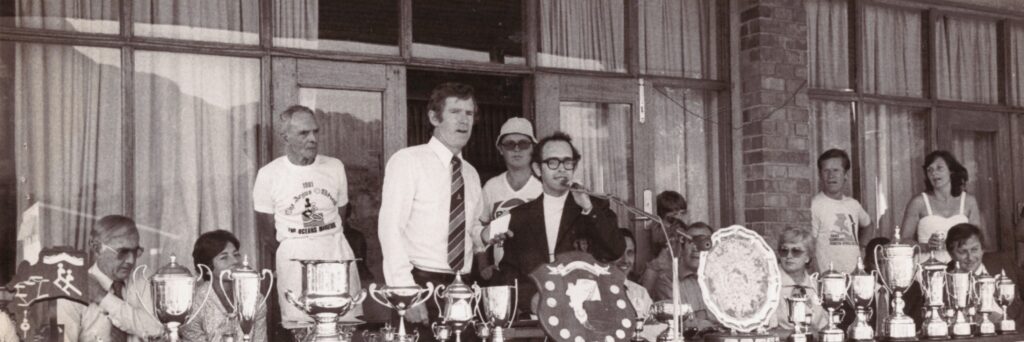
“Chet led a group of outstanding volunteers on the Two Oceans committee, who respected him completely and would do almost anything for him. Once he decided to stand down, most of them also withdrew from the committee.
“For me, the best years at Two Oceans paralleled the explosion of the sport in the late 1970s and 1980s, when the race attracted many of South Africa’s top distance athletes.”
Berman recalled the excitement each year leading up to race week. “There were so many highlights – from the carbo-loading evening to the post-race celebrations at the Sainsburys’ home. Those were heady times when everyone was talking about Two Oceans and it won recognition as the ‘best organized race in South Africa’ for four successive years.
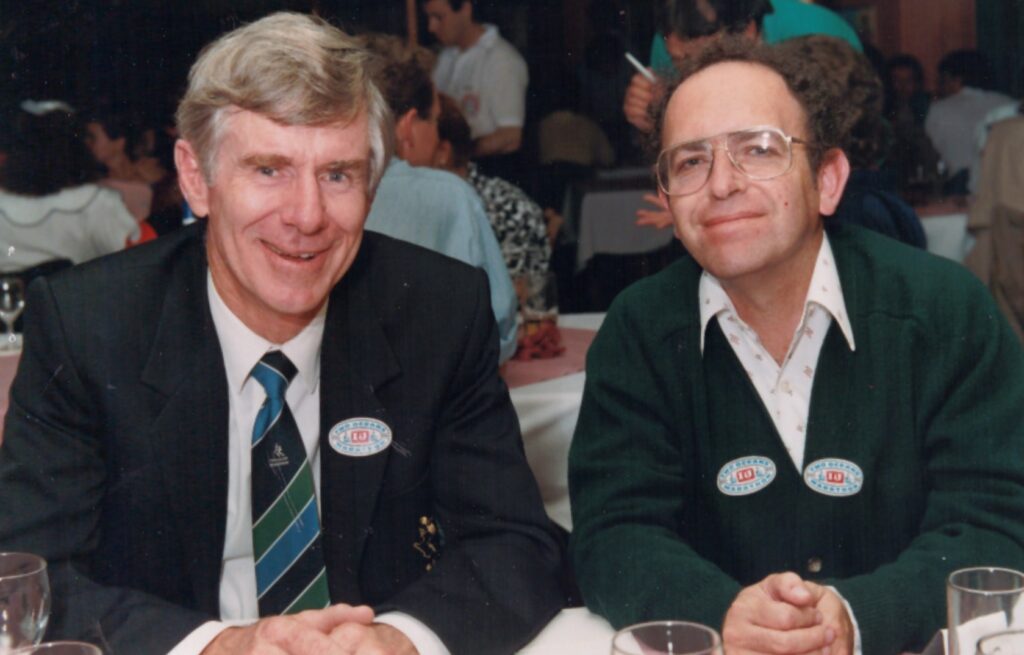
“One of the most exciting finishes I commentated was in 1976 when Gabashane Rakabaele and Allan Robb entered the grounds at Brookside together, racing neck and neck to the finish. Rakabaele outsprinted Robb to claim an historic victory.
“And the record-breaking achievements by Rakabaele (3:08:56 in 1979), Johnny Halberstadt (3:05:37 in 1981), Thompson Magawana (3:05:31 and 3:03:44 in 1987 and 1988) and Frith van der Merwe in 1989 (3:30:36) were great highlights.
“I always enjoyed the successes of our Celtic Harriers athletes. Don Hartley won in 1972 and 1973, Liz Eglington in 1987 and best of all were Monica Drögemoller’s four wins between 1988 and 1992.”
But it wasn’t all plain-sailing and Berman’s pre-dawn dulcet tones on race-day were not always appreciated by local residents near Brookside.
“In the early 1980s I was announcing from a high tower at Brookside in Claremont, before the start of the Two Oceans when I was approached by a policeman,” Berman recalls. “He told me to come down from the tower and that he was acting on complaints about my disturbing the peace. He instructed me to cease or I would face a fine or prison sentence.
“But I felt I had to continue announcing as I was acting under instructions of the Race Director, so as soon as the policeman was out of sight, I climbed the tower again and continued my commentary! I felt there were many lawyers, judges and others amongst the runners who would have supported me if it came to that!”
Berman’s ‘best of times, worst of times’ inevitably come down to his interactions with people.
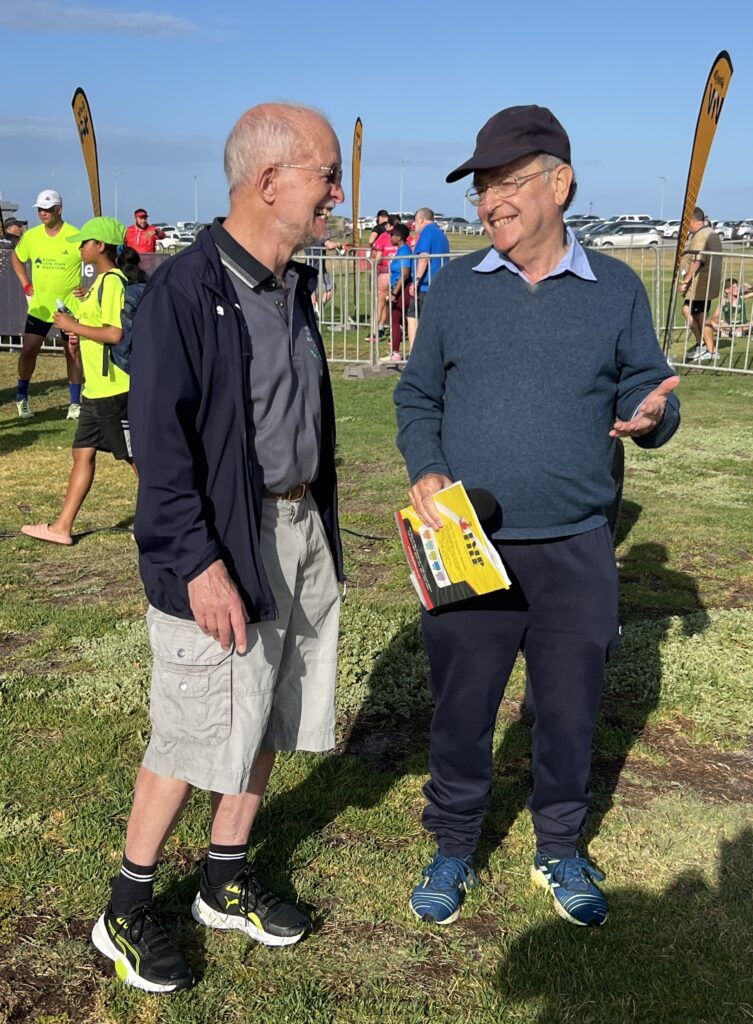
“Perhaps the happiest part of my job has been interacting with so many diverse people, either at races or at club social events where I had been asked to speak. The worst part was the in-fighting which took place.
“I always believed that at a race everyone was equal, so I never used peoples’ titles, such as doctor, professor, judge or cabinet minister. To me runners were all equal on the day, whether they were doctors, cleaners or even those who’d served time in jail.
“So many people coming together from different political and religious backgrounds to take on a physical challenge together is a great thing which our sport offers. Perhaps unique to distance running is that judges, professors and political leaders line up for our races on the same footing as ordinary citizens.”
Berman believes that the sport in the Western Cape is well-served by younger announcers and that the time is right for him to hand over to the next generation. “Each announcer has his or her own style and the Western Cape is fortunate to have two of the ability of Dean Hewitt and Sean Falconer.
“Falconer also extends his announcing to trail running, while I’m impressed with Dean Hewitt’s ability to recall names and faces of many of the local runners. I believe he is the fourth brother in his family to have served as head boy at Brackenfell High School!”
